Opera in Song, Opera Holland Park review – world-class singers in a brilliant recital triptych | reviews, news & interviews
Opera in Song, Opera Holland Park review – world-class singers in a brilliant recital triptych
Opera in Song, Opera Holland Park review – world-class singers in a brilliant recital triptych
Baritone Julien Van Mellaerts and pianist Dylan Perez programme a winning mini-festival
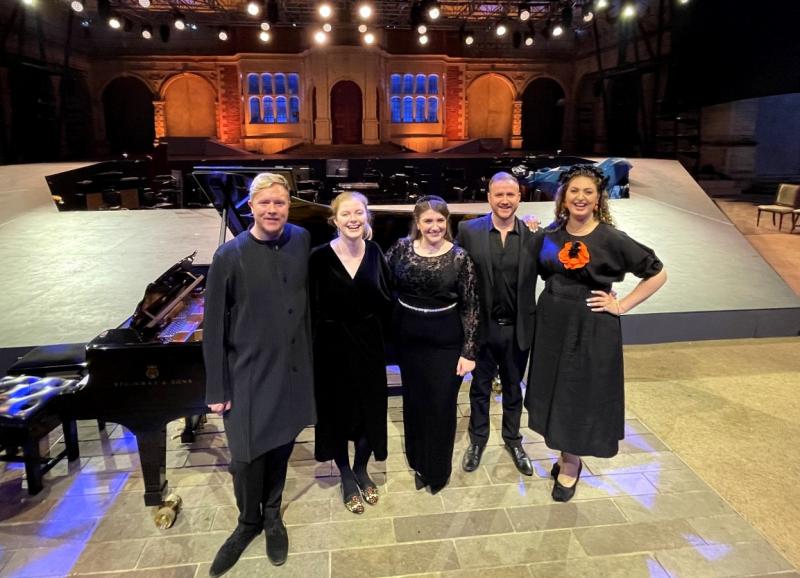
Now that the summer opera-house companies have pulled off staged triumphs under the most difficult of circumstances, it’s time to celebrate semi-al-fresco concerts. Not so many have cropped up as I’d hoped after the success of the Battersea Park Bandstand Chamber Music series last year.
The idea was simple, motivated by the hard time and the infinite number of cancellations singers and instrumentalists have endured over the past 16 months, the details more difficult to fine-tune, but successfully achieved: three concerts linking the song repertoire to operas in OHP’s current season: the darker side of Janáček plus Dvořák to complement The Cunning Little Vixen on the first night, repertoire already well under tenor Nicky Spence’s belt; a generous range of songs, arias and operatic scenes reflecting the trajectories of Verdi’s La traviata and Tchaikovsky’s Eugene Onegin (not in this season, planned for 2020 with the second night’s star, Armenian sopano Anush Hovhannisyan as Tatyana and Spence as Lensky; hopefully it will re-enter the schedules); and a delectable journey in song around the four acts of The Marriage of Figaro with Van Mellaerts and the fabulous Louise Alder (a rather starry replacement for the Countess of this season, Nardus Williams, with whom the original programme had been devised). 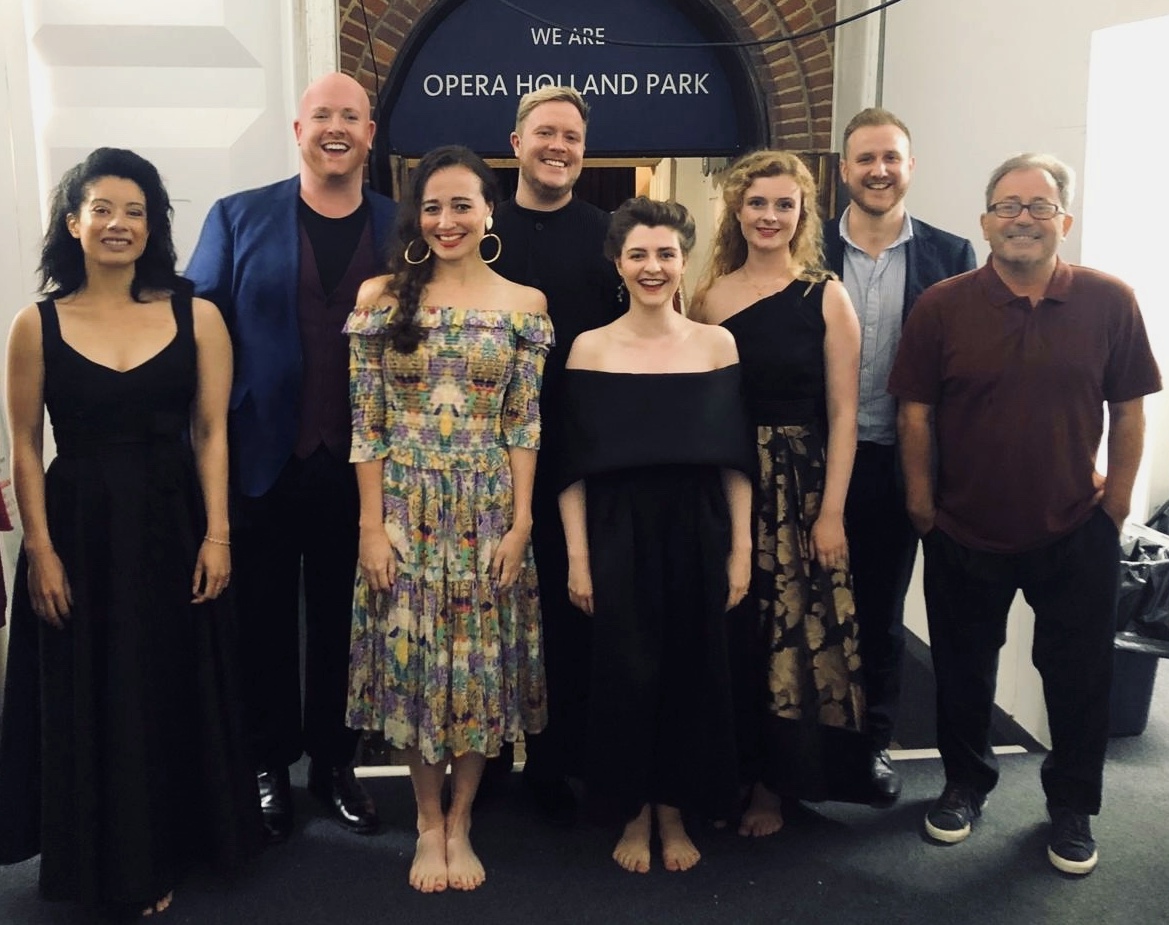 As a triptych, for those of us lucky to catch all three, it worked superbly. Despite one joyous number from a selection of Janáček’s Moravian folk-poetry settings, encored with percussive support from Spence and his remarkable mezzo, Fleur Barron, the opening night was introspective, half in love with easeful death, half with dangerous and difficult love; rain on canvas suited the melancholy well. Generous inclusion of three young singers either still at music college or just out of it paid off with the total confidence and stage ease of sopranos Charlotte Bowden and Isabelle Peters and mezzo Charlotte Badham, supported by Perez. Two groups of four strikingly arranged songs – three solos and an ensemble number in each – touched on themes familiar from Janáček’s Jenůfa: village girls preparing for their lovers’ departure for the wars, even the famous rosemary which jealous Laca has poisoned in the opera made an appearance. (Pictured above from left to right: Peters, Spence, Barron, Perez, Bowden, Badham, Van Mellaert and James Clutton).
As a triptych, for those of us lucky to catch all three, it worked superbly. Despite one joyous number from a selection of Janáček’s Moravian folk-poetry settings, encored with percussive support from Spence and his remarkable mezzo, Fleur Barron, the opening night was introspective, half in love with easeful death, half with dangerous and difficult love; rain on canvas suited the melancholy well. Generous inclusion of three young singers either still at music college or just out of it paid off with the total confidence and stage ease of sopranos Charlotte Bowden and Isabelle Peters and mezzo Charlotte Badham, supported by Perez. Two groups of four strikingly arranged songs – three solos and an ensemble number in each – touched on themes familiar from Janáček’s Jenůfa: village girls preparing for their lovers’ departure for the wars, even the famous rosemary which jealous Laca has poisoned in the opera made an appearance. (Pictured above from left to right: Peters, Spence, Barron, Perez, Bowden, Badham, Van Mellaert and James Clutton).
The big numbers were both cycles of sorts. Dvořák’s Gypsy Songs have a Carmen-like protagonist, longing for love and freedom, fatalistic about death, relieved by reverie in “The woods are silent” – pure introspective magic from Perez here – and the nostalgic hit we know as “Songs my mother taught me”. They could not have had a more persuasive advocate than Barron, a real mezzo star already launching on roles like Carmen worldwide. Of course she also played the gipsy Zefka who makes her vocal appearance halfway through Janáček’s The Diary of One Who Disappeared, one of the most original song-cycles in the repertoire.
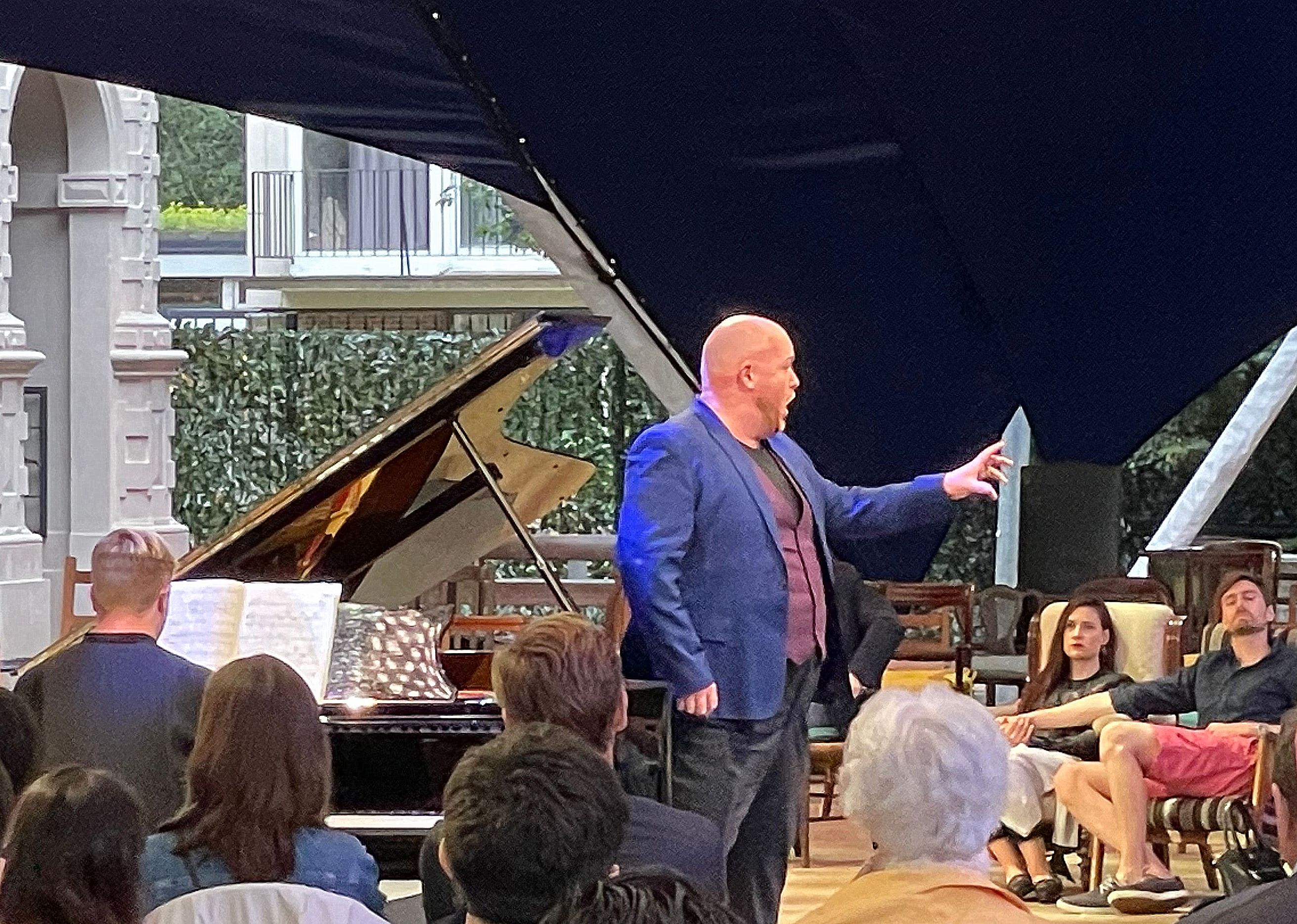 Our hero (Spence pictured left) is a tormented village lad who leaves behind the familiar life for an unknown future with Zefka and their child. Part narration, part embodiment of character, the work cries out for dramatic realization – though emphatically not a full staging of the kind Ivo van Hove essayed, and failed, partly through taking the setting away from its outdoor country location. Here everything was visualized and felt through the myriad colours in Spence’s voice, further haunted by the mezzo and the three other female voices, more distant. This was the magic of dramatic song at its most perfectly realized.
Our hero (Spence pictured left) is a tormented village lad who leaves behind the familiar life for an unknown future with Zefka and their child. Part narration, part embodiment of character, the work cries out for dramatic realization – though emphatically not a full staging of the kind Ivo van Hove essayed, and failed, partly through taking the setting away from its outdoor country location. Here everything was visualized and felt through the myriad colours in Spence’s voice, further haunted by the mezzo and the three other female voices, more distant. This was the magic of dramatic song at its most perfectly realized.
Perez shared the very distinguished and poetic pianistic honours the following evening with Ella O’Neill. After their modest binding-together of Prelude and Act One party numbers from La traviata, Hovhannisyan very much took command, with typically warm-hearted presentation and a mastery of the bel canto style she will be commanding as Violetta at the Royal Opera in November. The biggest challenge was Liszt’s Three Petrarch Sonnets. In setting Italian, as the soprano remarked, Liszt becomes a true native; some of us were lucky to hear it, too, in a realization of his unfinished opera Sardanapalo at the Suoni dal Golfo Festival in Lerici, where Hovhannisyan played the heroine. Hers is a potentially big, lirico spinto voice which she can hone to lyric perfection. The full opulence of the top can only be unleashed at selective points, and it was impressive that she took such risks in the second and most impassioned setting, “Benedetta sia ‘l giorno”.
We heard other sides to this fascinating instrument in art-songs by Armenian composers – Petrosyan’s “When my eyes seek you” gave the singer a bit of unintentional self-indulgence with the refrains ‘anush, anush, anush” (the word means “sweet”). Truly extraordinary were the native melismas of the spellbinding “Lullaby” by Komitas. Hovhannisyan should give us at least a whole half-recital of her native repertoire. Take note, Wigmore Hall.
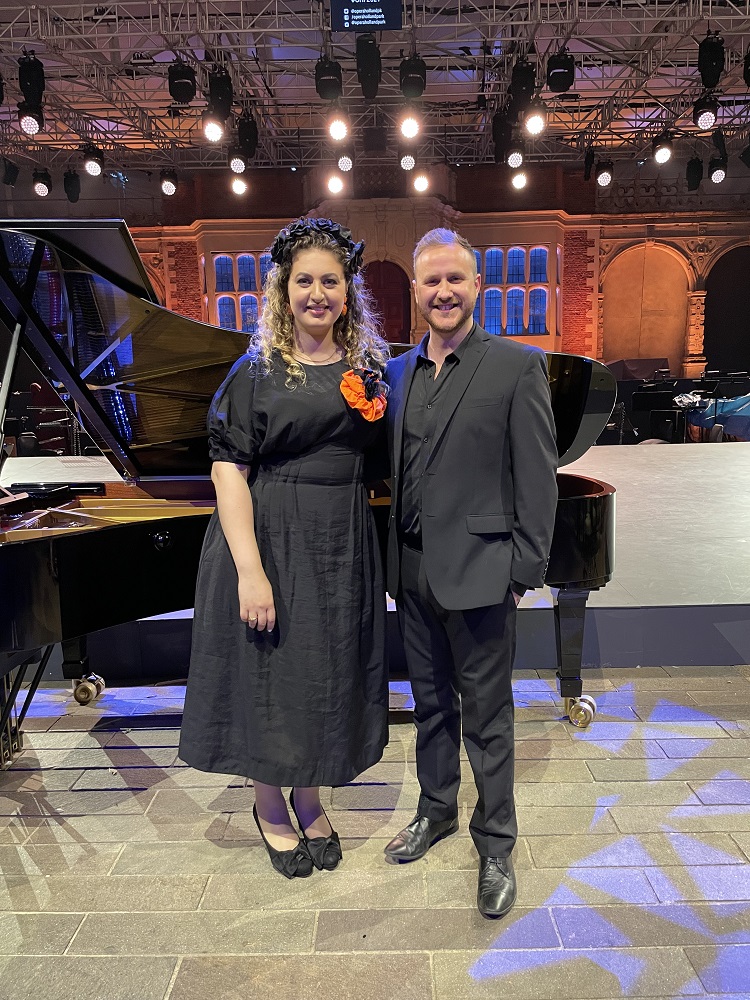 Her ability to scale down and match another voice was most impressive in three of Tchaikovsky’s Six Duets, sharing the limelight with a mezzo she’s helped coach at Florence’s Fondazione Mascarade Opera Studio, Lauren Young. Another wonderful presence, another exciting mezzo voice with contralto extension like Barron’s; you can hear her as the Witch in British Youth Opera’s Hansel and Gretel, coming to OHP in August. The artistry revealed the wonder of these songs; the second in the selection, “Passion Spent”, is tumultuous. To end, we had the final scene from Eugene Onegin. Van Mellaerts (pictured right with Hovhannisyan) should play the title role complete soon; this was a fully realized love-too-late denouement, though more time would have released both singers from their music stands and allowed them to properly suggest a staging as Spence had the night before.
Her ability to scale down and match another voice was most impressive in three of Tchaikovsky’s Six Duets, sharing the limelight with a mezzo she’s helped coach at Florence’s Fondazione Mascarade Opera Studio, Lauren Young. Another wonderful presence, another exciting mezzo voice with contralto extension like Barron’s; you can hear her as the Witch in British Youth Opera’s Hansel and Gretel, coming to OHP in August. The artistry revealed the wonder of these songs; the second in the selection, “Passion Spent”, is tumultuous. To end, we had the final scene from Eugene Onegin. Van Mellaerts (pictured right with Hovhannisyan) should play the title role complete soon; this was a fully realized love-too-late denouement, though more time would have released both singers from their music stands and allowed them to properly suggest a staging as Spence had the night before.
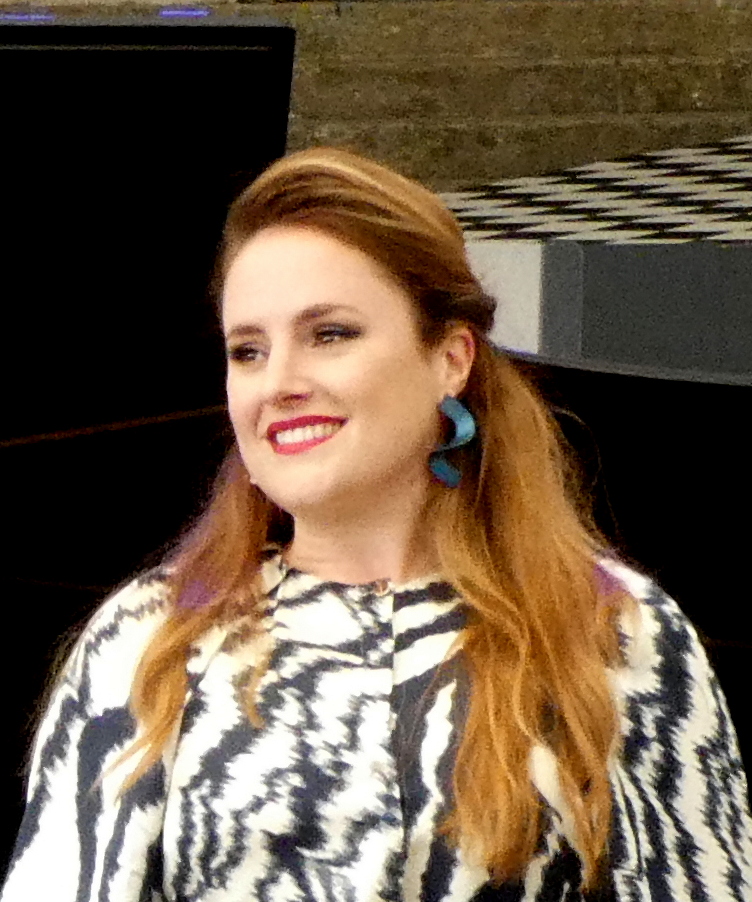
Loneliness for both the Almavivas was poignantly expressed by Alder in American desolation from Amy Beach and Copland, by Van Mellaert in an unorthodox Schumann song I’m glad to know, “Ich wandelte unter den Bäumen”. Then comic relief in a door-knocking duet – vaguely paralleling the closet confusion of Figaro’s Act 2 Finale – by Brahms. Just as Mozart gives the biggest numbers to the Almavivas in Act Three, so our two lovers hit the depths, with wondrous pianissimos, in Duparc’s “Chanson Triste” (Alder) and “Phydilé” (Van Mellaert, perfection here). 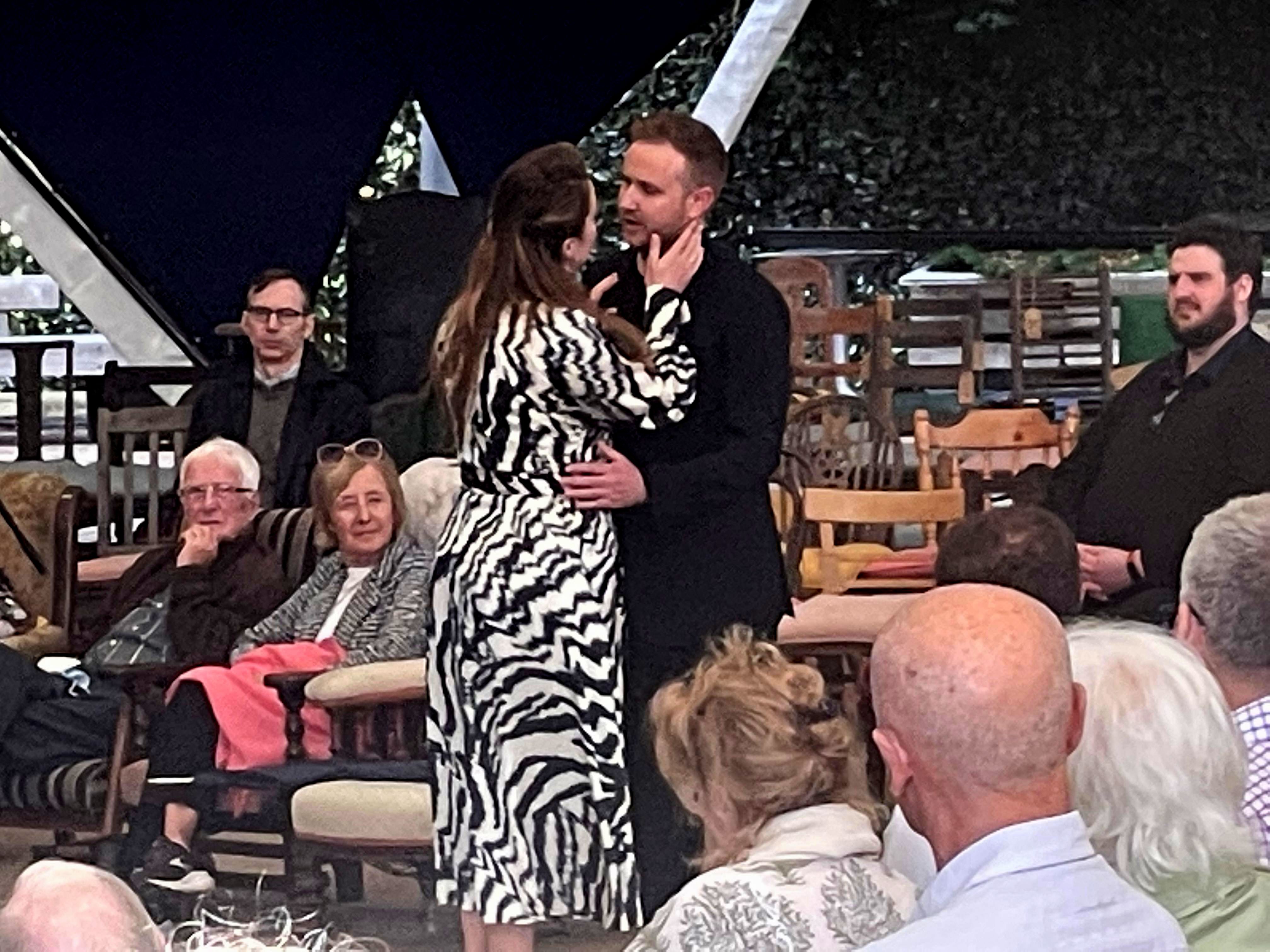 What could match the beauty of the Countess’s forgiveness in Act Four? Oddly, Lehar’s Merry Widow Waltz, “Lippen schweigen” did the tearful trick – operetta,too, can be sublime in its tenderest moments (don't forget that Gustav and Alma Mahler waltzed around the room to this beauty). As if the Count were up again to his old tricks, perfectly illustrated by the insertion of the Act Three Count-Susanna duet earlier, we had “Là ci darem la mano” as encore, Alder’s raised eyebrow at remembering Masetto just one typical detail of her life-enhancing art. If only the OHP space, acoustically so good for song recitals - and the supertitle translations, even if they didn't work at all times, are so preferable to song texts in printed programmes - could stay up for the whole of September. Next year, more of this, please, and maybe the inclusion of a string quartet or two to bring more people to the wonderful world of chamber music as well as song.
What could match the beauty of the Countess’s forgiveness in Act Four? Oddly, Lehar’s Merry Widow Waltz, “Lippen schweigen” did the tearful trick – operetta,too, can be sublime in its tenderest moments (don't forget that Gustav and Alma Mahler waltzed around the room to this beauty). As if the Count were up again to his old tricks, perfectly illustrated by the insertion of the Act Three Count-Susanna duet earlier, we had “Là ci darem la mano” as encore, Alder’s raised eyebrow at remembering Masetto just one typical detail of her life-enhancing art. If only the OHP space, acoustically so good for song recitals - and the supertitle translations, even if they didn't work at all times, are so preferable to song texts in printed programmes - could stay up for the whole of September. Next year, more of this, please, and maybe the inclusion of a string quartet or two to bring more people to the wonderful world of chamber music as well as song.
rating
Explore topics
Share this article
The future of Arts Journalism
You can stop theartsdesk.com closing!
We urgently need financing to survive. Our fundraising drive has thus far raised £49,000 but we need to reach £100,000 or we will be forced to close. Please contribute here: https://gofund.me/c3f6033d
And if you can forward this information to anyone who might assist, we’d be grateful.

Subscribe to theartsdesk.com
Thank you for continuing to read our work on theartsdesk.com. For unlimited access to every article in its entirety, including our archive of more than 15,000 pieces, we're asking for £5 per month or £40 per year. We feel it's a very good deal, and hope you do too.
To take a subscription now simply click here.
And if you're looking for that extra gift for a friend or family member, why not treat them to a theartsdesk.com gift subscription?

Add comment